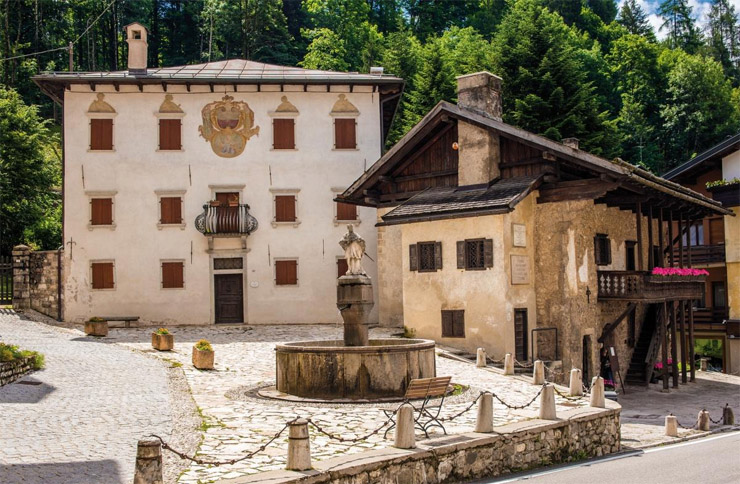
베첼리오 티치아노 (1488?-1576)
티치아노 베첼리오는 북이탈리아 피에베 디 카도레에서 출생한 이탈리아의 전성기 르네상스 시대에 활약했던 화가이다. 그의 화법과 특히 그의 색채 처리는 그의 동시대 화가들만이 아니라 후세대의 화가들에게도 강력한 영향을 미쳤다. 그에게서 영향을 받은 화가들의 범위는 페터 파울 루벤스에서부터 시작해서 앙투안 와토를 거쳐 외젠 들라크루아까지 이어졌다.
[자세히보기]Titian (1488?-1576)
...Recognized by his contemporaries as "The Sun Amidst Small Stars" Titian was one of the most versatile of Italian painters, equally adept with portraits, landscape backgrounds, and mythological and religious subjects. His painting methods, particularly in the application and use of colour, would exercise a profound influence not only on painters of the Italian Renaissance, but on future generations of Western art.
[Learn more]Source : Wikipedia
ⓢ Casa di Tiziano / 티치아노 생가

Casa natale di Tiziano Vecellio
The house where Titian was born, in the late 15th century, possibly 1488–1490, has been rebuilt and restored several times over the ages, but it still maintains the look of an ancient house in the style of that region. Some walls are entirely covered in wood, the furniture is rustic and the atmosphere welcomes the visitor into the world of the painter remembered for his great works.
[Learn more]Source : Wikipedia
□ Sacred and Profane Love (Galleria Borghese, Roma) / 천상과 세속의 사랑 (보르게세 미술관, 로마)

Sacred and Profane Love
Sacred and Profane Love is an oil painting by Titian, probably painted in 1515, early in his career. The painting is presumed to have been commissioned by Niccolò Aurelio, a secretary to the Venetian Council of Ten, whose coat of arms appears on the sarcophagus or fountain, to celebrate his marriage to a young widow, Laura Bagarotto.
[Learn more]Source : Wikipedia
□ Venus of Urbino (Galleria degli Uffizi, Firenze) / 우르비노의 비너스 (우피치 미술관, 피렌체)
Venus of Urbino
The Venus of Urbino is an oil painting by the Italian painter Titian, which seems to have been begun in 1532 or 1534, and was perhaps completed in 1534, but not sold until 1538. It depicts a nude young woman, traditionally identified with the goddess Venus, reclining on a couch or bed in the sumptuous surroundings of a Renaissance palace. It is now in the Galleria degli Uffizi in Florence.
[Learn more]Source : Wikipedia
□ Penitent Magdalene (Hermitage Museum, Saint Petersburg) / 참회하는 성 마리아 막달레나 (에르미타주 미술관, 상트페테르부르크)
□ An Allegory of Prudence (National Gallery, London) / 신중함의 알레고리 (내셔널 갤러리, 런던)

□ Assumption of the Virgin (Santa Maria Gloriosa dei Frari, Venice) / 성모승천 (산타마리아 글로리오사 데이 프라리 성당, 베니스)
□ Pala Pesaro (Santa Maria Gloriosa dei Frari, Venice) / 페사로 제단화 (산타마리아 글로리오사 데이 프라리 성당, 베니스)

□ Mary Magdalene (Palatine Gallery, Firenze) / 막달라 마리아 (팔라티나 미술관, 피렌체)
□ La Bella (Palatine Gallery, Firenze) / 라 벨라 (팔라티나 미술관, 피렌체)

□ Bacchus and Ariadne (National Gallery, London) / 바쿠스와 아리아드네 (내셔널 갤러리, 런던)

바쿠스와 아리아드네
아리아드네는 자신을 남겨두고 항해를 떠난 연인 테세우스에게 버림 받고 낙소스 섬에 홀로 남게 되었는데, 난봉꾼 행렬을 이끌며 치타가 모는 전차를 타고 다니는 바쿠스 신에게 발견된다. 그림에서 바쿠스는 짐승들로부터 아리아드네를 보호하고자 전차에서 뛰어내리는 모습으로 묘사되어 있다. 아리아드네 위의 하늘에는 그녀의 왕관이 나타나 있는데, 이 왕관은 바쿠스가 하늘에 던진 것으로, 왕관자리가 된다.
[자세히보기]출처 : Wikipedia
Bacchus and Ariadne
Ariadne has been left on the island of Naxos, deserted by her lover Theseus, whose ship sails away to the far left. She is discovered on the shore by the god Bacchus, leading a procession of revelers in a chariot drawn by two cheetahs (these were probably modelled on those in the Duke's menagerie and were tigers in Ovid's original text...
[Learn more]Source : Wikipedia










 HOME
HOME



 0
0




